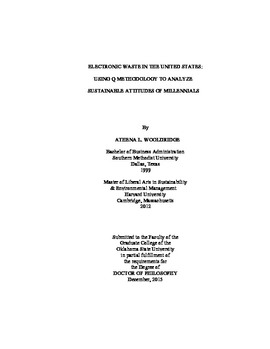| dc.description.abstract | Using Q methodology (Brown, 1980; Stephenson, 1953; Watts & Stenner, 2012), this research study involved the collection of data from consumers age 18-25 years (Millennials) who have participated actively in the purchase of a cellular device, e-reader, game console, computer, or tablet in the past 12 months. A systematic study of subjectivity, Q methodology allows researchers to quantify qualitative statements such as viewpoints, opinions, and attitudes (van Exel, 2005). Because Millennials represent the largest group of technology consumers and disposers of small electronic waste in the world, it is important to understand the subjective preferences of this cohort in order to mitigate the growing electronic waste problem. Twenty participants sorted the 42 statements according to the condition of instruction "What are your thoughts about small electronic devices that you no longer use?" A conceptual framework was used to investigate Millennials perceptions regarding electronic waste that included six categories including personal connection/identity, monetary-related, knowledge base, security, social relevance, and convenience. Environmental narrative was used as the theoretical framework to guide data analysis and interpretation. Three viewpoints emerged: "Convenient Environmentalist" (Factor 1), "Gadget Guru" (Factor 2), and "Throwaways" (Factor 3). Convenient Environmentalists are concerned about the environment and will engage in sustainable behavior if it is convenient for them or they are incentivized. Gadget Gurus buy the latest technology and prefer to sell their old devices. They thrive on being validated and recognized for their behavior and want to be incentivized in order to act sustainably. Throwaways appear to be unaware about the effects of electronic waste and readily discard their devices. They are apathetic toward sustainable behavior and feel as though such activities do not make a difference. The three emerging viewpoints reflected several conclusions including social responsibility, validation and recognition, convenience, and incentive. Each of these conclusions is reflected differently in the three viewpoints making each distinct yet influenced by the generational characteristics referenced in the literature. Implications of these findings provides strong evidence for a systemic program to motivate and inform Millennials regarding electronic waste using positively-framed narratives from their peers and respected authority figures. | |
